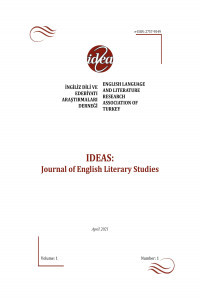Magic and Collage: Language in Ginsberg’s "Wichita Vortex Sutra"
Magic and Collage: Language in Ginsberg’s "Wichita Vortex Sutra"
"Wichita Vortex Sutra" might be Allen Ginsberg’s most successful anti-war poem. Written in the technique of the collage, and inspired by Burroughs' cut-ups, the poem presents a variety of voices. These include a Whitmanian, prophetic tone which becomes increasingly prevalent and the mediatic chaos of the news, featuring advertising, newspaper extracts, and radio broadcasts. In "Wichita Vortex Sutra," Ginsberg’s use of language is especially noteworthy: on the one hand, the poet charges language with a spiritual, magical power, and on the other hand, he destroys it, fragments it, and recreates it through the collage. This article explores Ginsberg’s experiments ‘with’ and ‘beyond’ language in this poem, analysing his use of voice throughout the piece and his philosophy of the cut-up. Ultimately, this article proposes an understanding of "Wichita Vortex Sutra" as a ‘magical collage,’ as a place where the spiritual and the political, the personal and the public, peacefulness and violence, and the East and the West meet.
Keywords:
Allen Ginsberg, American poetry, Beat generation, Collage Cut-up,
___
- Austin, J. L. How to Do Things with Words: The William James Lectures Delivered at Harvard University in 1955, edited by J. O. Urmson and Sbisà Marina, Oxford UP, 2009.
- Banash, David. Collage Culture: Readymades, Meaning, and the Age of Consumption. Rodopi, 2013.
- Brunner, Edward. Cold War Poetry. U of Illinois P, 2001.
- Cran, Rona. “Material Language for Protest: Collage in Allen Ginsberg’s ‘Wichita Vortex Sutra’.” Textual Practice, vol. 34, no. 4, 2018, pp. 669–689. JSTOR, doi: 10.1080/0950236x.2018.1517105.
- Ginsberg, Allen. “An Exposition of William Carlos Williams’s Poetic Practice.” Composed on the Tongue: Literary Conversations, 1967-1977, edited by Donald Allen, Grey Fox, 2001, pp. 123-140.
- Ginsberg, Allen. “Improvised Poetics.” Composed on the Tongue: Literary Conversations, 1967-1977, edited by Donald Allen, Grey Fox, 2001, pp. 18-62.
- Ginsberg, Allen. Prose Contribution to Cuban Revolution. Artists' Workshop, 1966.
- Ginsberg, Allen. “The New Consciousness.” Composed on the Tongue: Literary Conversations, 1967-1977, edited by Donald Allen, Grey Fox Press, 2001, pp. 63-93.
- Ginsberg, Allen. “The Paris Review Interview (Paris Review).” The Essential Ginsberg, edited by Michael Schumacher, Penguin Modern Classics, 2015, pp. 259-296.
- Ginsberg, Allen. “Wichita Vortex Sutra.” Planet News. City Lights Books, 1988, pp. 110-132.
- Katz, Eliot. The Poetry and Politics of Allen Ginsberg. Beatdom, 2016.
- Manganelli, Giorgio. Prefazione. Foglie D'Erba, by Giorgio Manganelli and Walt Whitman. BUR Rizzoli, 2013, pp. i-vi.
- Matthiessen, F. O. American Renaissance: Art and Expression in the Age of Emerson and Whitman. Literary Licensing, 2013.
- McGuiness, Daniel. “The Long Line in Contemporary American Poetry.” The Antioch Review, vol. 47, no. 3, 1989, p. 269. JSTOR, doi: 10.2307/4612064.
- Nelson, Deborah. Pursuing Privacy in Cold War America. Columbia UP, 2002.
- Nolan, James. Poet-Chief: The Native American Poetics of Walt Whitman and Pablo Neruda. U of New Mexico P, 1994.
- Ramazani, Jahan. Poetry and Its Others: News, Prayer, Song, and the Dialogue of Genres. U of Chicago P, 2014.
- Raskin, Jonah. American Scream: Allen Ginsberg's Howl and the Making of the Beat Generation. U of California P, 2005.
- Schumacher, Michael. Dharma Lion. St. Martin's, 1994.
- Stevens, Wallace. The Necessary Angel: Essays on Reality and the Imagination. Vintage, 1951.
- Tytell, John. Naked Angels – Kerouac, Ginsberg, Burroughs: The Lives and Literature of the Beat Generation. McGraw-Hill, 1976.
- Whitman, Walt. American Primer. Read Books, 2013.
- Whitman, Walt. Song of Myself: Walt Whitman’s Leaves of Grass. Edited by Malcolm Cowley, Penguin, 1976.
- Williams, William Carlos. “To Daphne and Virginia.” The Collected Poems of William Carlos Williams. Edited by A. Walton Litz and Christopher J. MacGowan, Paladin, 1991.
- Başlangıç: 2021
- Yayıncı: İngiliz Dili ve Edebiyatı Araştırmaları Derneği / English Language and Literature Research Association of Turkey
Sayıdaki Diğer Makaleler
Review of A Regarded Self: Caribbean Womanhood and the Ethics of Disorderly Being
Literary Cycling and Its Importance in the Accounts of Joseph and Elizabeth Robins Pennell
Magic and Collage: Language in Ginsberg’s "Wichita Vortex Sutra"
Cosmopolitanism, Mobility and Hybridity in Shakespeare's Antony and Cleopatra
Transmitted Memories in David Whitehouse's The Long Forgotten
